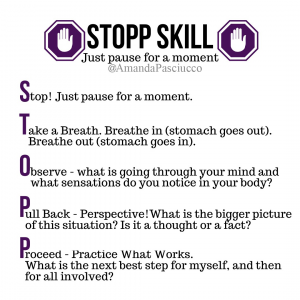The Importance of Being Understood Instead of Right Fighting in Relationships
The Importance of Being Understood Instead of Right Fighting in Relationships
A common issue we hear from our clients is communication, their lack of being understood and “right fighting” for a particular perspective.
Many couples will say in a session “we can’t communicate.”
Clinically, this may signify that the therapist will “translate” each individual perspective within the psychotherapy session.
Often, it isn’t about “being right;” rather, it is about not understanding or hearing, and thus, an individual is missing out on their needs of being understood, seen, and heard.
Yes, we can teach mirrored reflective listening, empathic and non-violent communication, yet at the core, all human beings have an innate desire to be heard and seen.
As humans, we communicate ALL the time, through verbal and non-verbal ways.
It is often not that we do not know how to communicate; it’s that we are not collaborating or using compassion in the ways we communicate with one another.
Therefore, we are right fighting, instead of collaborating in connection.
Right Fighting
Most often, I notice people in relationships who are focusing on “winning” or being “smarter” or “right.” I see this in romantic relationships, parent child relationships, friendships, etc. I often say to the people I am working with “I am wondering why you feel like you have to convince me” or my personal favorite “I am not a judge or jury!’
Usually people are surprised when I say those things and try to redirect them in session to have other goals (such as connection, problem solving, or conflict resolution).
All too often in our culture we are more focused on being heard than hearing what the other person is saying. This is usually rooted in our own personal traumas or feelings of powerlessness in our life. So instead of focusing on fixing the issue, we get stuck in the “facts” and our own perspective.
I call it “right fighting” and others call it “gridlock” or something else. Either way, it is one of the most common dynamics I see between people in my office. We are all guilty of this. I know this is something I have worked extremely hard on, myself. It is not easy work, but it is important work.
Inner Aspects Method (IAM) for Being Understood
One of the most transformative ways to support is utilizing a trauma-informed approach such as the Inner Aspects Method (IAM).
IAM is an identity-affirming, trauma-focused approach used to increase insight to the various parts of our personality. Mostly, it helps us understand why we act the way we do. It focuses predominantly on bringing consciousness (or presence of mind) or awareness to what we are doing and why we are doing it.
At the core of the IAM model is compassion and collaboration, which ultimately enhances people’s connection to themselves and others.
When an individual slows down what is happening to notice the aspect of themselves that is engaged, it provides more clarity. When this happens, individuals are able to notice the need under their emotions and thoughts, and then have a choice. The choice can be to alter and adapt a new strategy.
For those specifically engaged in “right fighting,” recognize that “being right” is a strategy you are using because a need is not being met.
Compassion Instead of Shame
There is nothing wrong with you, it is important to notice you have a choice in finding another strategy though… a strategy that can connect you.
When each individual in a disagreement is able to connect to their underlying need not being met, it allows for faster conflict resolution.
When realigning the goal from “being right” to connection and collaboration, there is greater ability for joy, attunement, and respect.
Finding a strategy to effectively and adaptively meet all needs is a healthier model of engaging than most individuals have been taught.
The goal of this is that the “problem is the problem,” rather than the person.
If you want to be right more than you desire to resolve the issue, that may be something to look at in individual counseling.
Recognizing the line of what is your responsibility and what is others is important in addressing issues about communication. So, use these tips to make long-lasting relationships work.
Strategies to Improve Being Understood:
Here are some quick tips on how to address this issue of right fighting in relationships right now!
- PAUSE what you are doing and SLOW down!
- Take a deep breath! There is a body of research describing the importance of taking a deep breath to help calm your physiological reaction
- Take a break if you need to.
- During this break, find an alternative strategy to calm your body.
- Consider a stretch, a calming app, meditate, listen to music, write, drink some water, do something active.
- Note: this break should not be TOO long – no more than 30 minutes ideally
- Reflect on what need is not being met.
- Find a way to communicate that to others and ask yourself “which part of me am I responding from?”
- Refocus your goal in the conversation to connection, collaboration, or conflict resolution
- Slow the conversation down
- Reflect back what the other person is saying – this is validation. VALIDATION IS NOT AGREEING it is just showing someone you are listening
- APPRECIATE, LISTEN, REFLECT, BREATH, RESPOND
- Rinse and Repeat as needed
STOPP Skill

If you cannot self regulate within the 30 minute break, please reach out to a mental health professional to help.
If you are interested in learning more about engaging in the IAM, we are happy to help you.
Life Coaching and Therapy (LCAT) is a relationship coaching and sex therapy practice that transforms our clients lives through our flexible, multi-technique approach and pleasure-skills training provided by systemically-trained and licensed therapists!

Our team of compassionate, licensed therapists and certified sex therapists help Millennials and Baby Boomers alike who visit us for a variety of relationship, intimacy and sex problems.
LCAT provides on-site appointments, as well as video chat and text therapy programs.
Learn more about how LCAT can help improve your life at What We Do.






